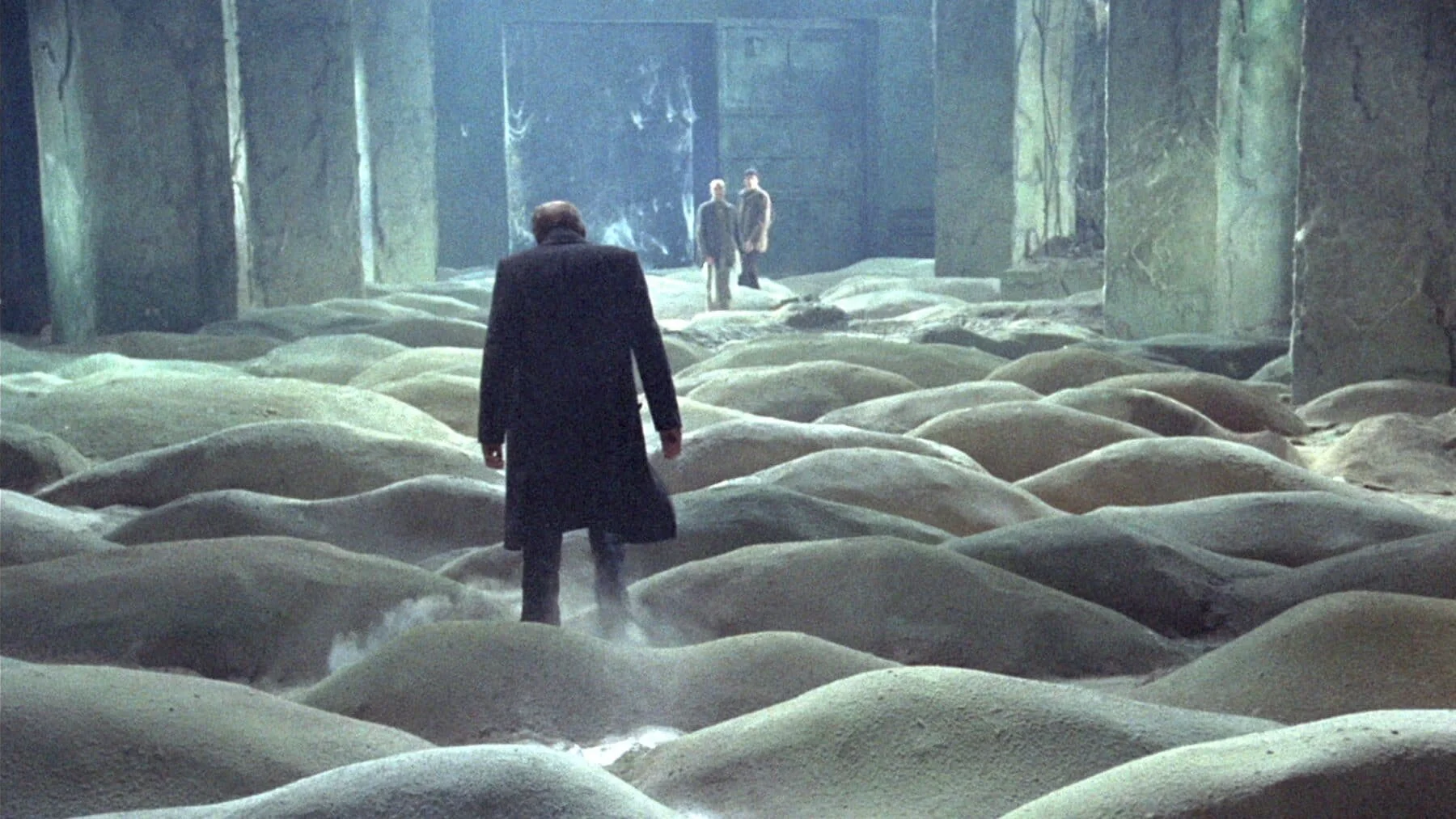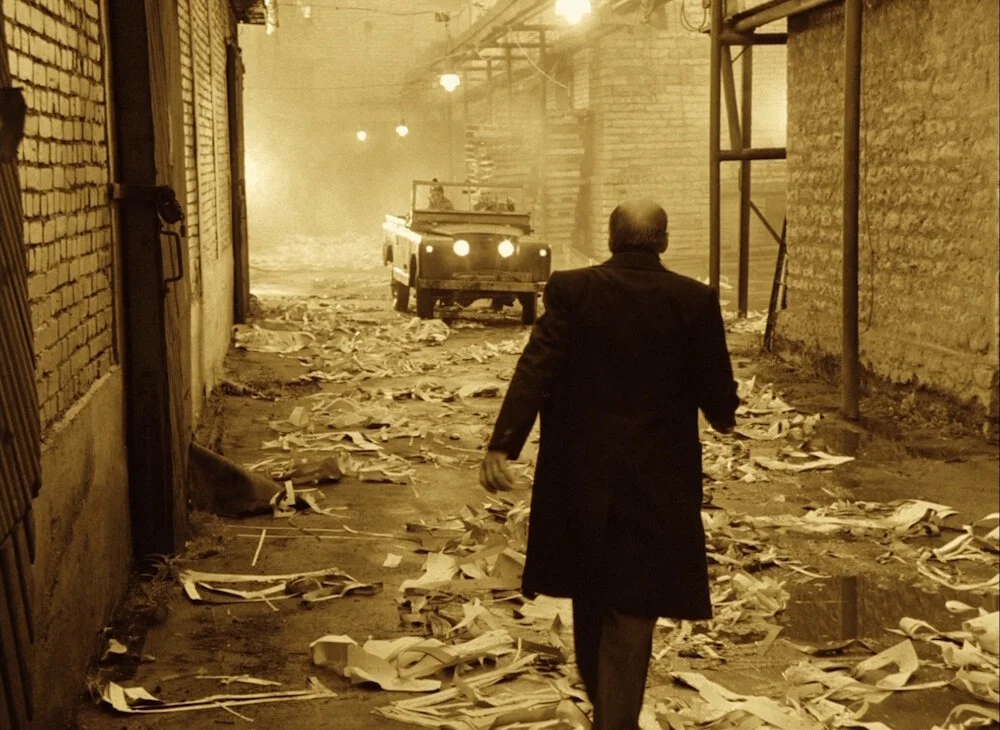Tarkovsky's Stalker
By Nadia Ash
Tarkovsky’s Stalker is a film which submerges the viewer within a landscape seeming to be riddled with decay and desolation, set within the stark context of a dystopian future. Grappling with matters intrinsic to the human condition, the sequence remains largely restricted to the perspectives of three characters, none of which are explicitly named. They are simply known as the Stalker, the Writer and the Professor. This absence of names only enhances the commonality of the characteristics that they each possess; they are applicable to us all, embodying flaws and peculiarities, outlooks and mentalities which are fundamental to human nature. We follow these three as they journey across a dismal land, making their way to the Zone, an elusive place shrouded in secrecy which is said to fulfill one’s deepest desires. Through this hauntingly sombre atmosphere, Tarkovsky delves into an exploration of the human mind, scrutinising facets integral to our natures through his depiction of the characters, each intertwined by their common aim to reach the Room, and the differing motives that propel them onwards.
The core of the film revolves around the concept of the Zone, both as a tangible landscape as well as a manifestation of the human condition, of our inherent insatisfaction with what we already have. In embarking upon this journey to the Zone, each character is striving for something external to their current lives, something more, something other, something - perhaps - illusory. The Stalker’s role is that of a guide to those who wish to seek out their innermost desires; he leads them on in their journey, embodying a kind of shepherd as he stresses the importance of respect within the Zone, accentuating the mystical, ethereal element which surrounds this elusive place. The boundaries between reality and illusion appear to blur within the Zone, and the characters find themselves unable to rely upon what would normally provide all sense of order, stability. The passage of time is distorted, memories seem to shift and disintegrate, and nothing is predetermined. This shifting, amorphous nature of the Zone could be seen as reflective of the very thing that it represents - our own hopes and desires. Here lies the tragedy of the Zone; whilst the characters set out in search of one tangible wish that they hope to be granted, even this they cannot rely upon. Human desires are just as elusive as the landscape of the Zone itself. Here, Tarkovsky has accentuated our inherent lack of control over our own natures, our inability to willfully choose our own desires. This grim truth is only emphasised in the Stalker’s story of Porcupine, a man who entered the Zone seeking to bring his brother back from the dead but whose fate ended in suicide when all he received was wealth. Hence, at the end of the film, the Writer and the Professor decide against entering the room, too afraid that their most suppressed desires are just as base and selfish as Porcupine’s.
The characters themselves reveal much about Tarkovsky’s exploration of the human psyche. Each could be seen to embody a certain mentality which impinges on their interaction and behaviour within the Zone. The Writer is characterised by his dejected cynicism, his sense of disillusionment even within his own craft. In his monologue, he laments, “what kind of a writer am I if I hate writing? If it’s constant torment, a painful, shameful occupation, like squeezing out hemorrhoids.” Having lost all inspiration, he had turned to the Zone, a final source of hope to propel his writing career onwards. But not even this dim glimmer of hope seems to have lifted him from his cynicism; when pondering the Zone, he says, “all this is someone’s idiotic invention,” and he seems to be almost longing for it all to prove worthless, if only to deepen his nihilism and satisfied sense of bitterness. The Professor, on the other hand, is distinguished by his inclination for rationalism, his scepticism for the mystical elements of the Zone. He longs to study it, to find some tangible way to measure it, intent on rejecting any kind of metaphysical dimension which would prevent him from scrutinising its nature. Although he behaves more cautiously than the Writer in the Zone, he nonetheless dismisses the Stalker’s urges to respect the ethereal, almost transcendent quality of this strange, unfathomable land. It is revealed towards the end of the film that his ultimate motive was to annihilate the Zone, to reduce the place to ashes on the pretext of preventing its use by people of evil intention. But perhaps it was the Zone itself that he feared, not the people; perhaps he deemed it as a threat, the intangible, ever-changing nature of it going against his inclination for order, for sense, for reason.
The Stalker, meanwhile, sees the Zone as a source of one thing only: Hope. He regards it his duty to bring people here to this place, despite its propensity for treachery, for grim fates such as that of Porcupine, because he believes that all those who have lost hope should be offered some glimmer of it back. The Zone is a last resort. The Zone is salvation. “I bring here people like me, dejected and tormented,” he says. “People who have nothing else to hope for.” And yet, even this fails to satisfy the souls of the anguished. As he says towards the end of the film, “it’s not enough, it’s not enough...” Even the Zone, even this place which defies all sense and reason, which can provide us with our deepest desires, is not enough to sate the human soul. This, for me, was one of the key messages of Tarkovsky’s Stalker. People are built in such a way that we will always be striving for something more, something other, and even powers which can transcend natural laws to provide us with those desires will still never be enough. Human satisfaction is a mere illusion, or, if it is achieved, it will only ever be on a temporary basis. But perhaps it is the hope which precedes this realisation of desires that we should value most; perhaps this is what Tarkovsky intended to project in his complex and deeply stimulating narrative of Stalker.
From a visual perspective, it is clear to see the sharp distinction between the representation of the Zone as a source of hope as opposed to the bleak, dismal reality of the world external to it. The scenes set in the Stalker’s home city are shot in a melancholic sepia, seeming to strip the vitality of the place through this absence of colour. Everything appears to be watered down, sombre, the people drifting onwards in a cycle of tedium and exhaustion. The Zone, on the other hand, teems with the lush greenery of the natural world, a stark juxtaposition to the world beyond its borders. This change from sepia to colour is the only way we realise that the characters have entered the Zone, illustrating the delicately crafted subtlety that Tarkovsky has sustained throughout the film. The Zone signifies hope, but it is a quiet sort of hope, something faintly eerie in its stillness and subtlety that seems to speak of its unpredictable and potentially dangerous effect on the human psyche. For each character is wrapped up in their own torments, and the limited dialogue throughout is a testament to this as they spend long periods lapsing into silence, pondering their own internal troubles as they seek out the hope that can be offered by the Zone. Tarkovsky plays upon these notions of stillness and subtlety throughout the film, weaving them into a sequence which depicts his astute examination of faith, nihilism and hope.
ST.ART does not own the rights to any images used in this article



